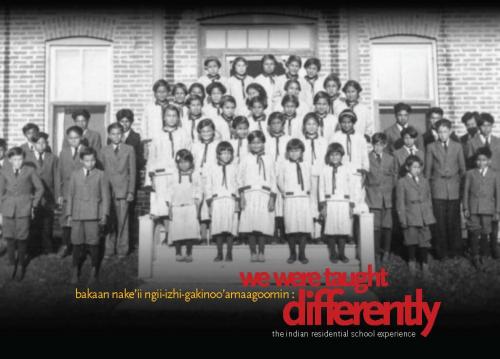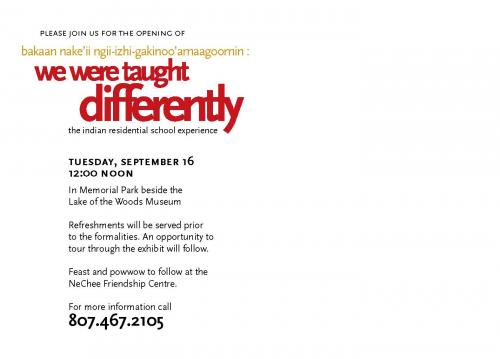Indian Residential School exhibit opening in Kenora - "We were taught differently"
From the Kenora Daily Miner and News
Residential school exhibit opens at museum
By Mike Aiken - Miner and News
A landmark display chronicling the residential school experience opened Tuesday. It was put together in partnership with NeChee Friendship Centre, Lake of the Woods Ojibway Cultural Centre, as well as the Lake of the Woods Museum. Elders and Kathleen and Robin Greene were among those to speak at the opening.
We were taught differently.
The title of the new exhibit at the Lake of the Woods Museum subtly hints at the vast historical difference between school systems in the area.
For the better part of a century, the federal government worked with church groups, who operated six Indian Residential Schools in Treaty 3 territory. These included Cecilia Jeffrey at Round Lake and St. Mary’s at Rat Portage.
Earlier this year, the prime minister offered an official apology on behalf of the government of Canada. However, local efforts at reconciliation were already well underway.
Over the last 18 months, the Lake of the Woods Museum, the NeChee Friendship Centre and the Lake of the Woods Ojibway Cultural Centre worked together on creating an exhibit that reflected the realities of survivors who are finally finding the courage to tell their stories.
During the opening ceremonies Tuesday, Elder Kathleen Greene of Shoal Lake remembered attending three residential schools. Two were in Prince Albert, Sask., and the other was Cecilia Jeffrey.
She recalled crying one day, when she was young, because she was homesick. However, another student came up behind her and told her to stop, since there was no way she would get to go home.
After that moment, Greene didn't shed a tear. When her principal tried to discipline her, he would get so mad because the tears never came, Greene remembered.
If she got beat up in a fight, the emotions never came, she said.
In her remarks, Treaty 3 Grand Chief Diane Kelly also spoke. While she isn't a survivor herself, many of her family members were, and the legacy has continued, she said.
Kelly noted her experience in Ottawa, as she witnessed the moving ceremony in the House of Commons. Even though the stories and testimonies she heard were very powerful, she wasn't able to show any emotion.
Back in June, as Treaty 3 members gathered to watch the apology on television at the Best Western, many speakers shared how the legacy of residential schools had impacted their lives. They described in personal terms how they grew up in families with parents who weren't able to share love or affection. As a result, they'd carried on the dysfunction, when they became parents themselves.
This often led to the breakdown of marriages and the disconnection of children from their mothers and fathers.
While many speakers offered their positive memories, it was difficult to ignore some dark realities.
"It's a very, very sad feeling to think about residential schools, and have to reflect on that," Kelly said.
Museum chairman Maureen Witherspon spoke about growing up on the south end of Lake of the Woods. While there was already some intergration of First Nations students into the school at Morson, many more still went to St. Margaret's in Ft. Frances.
"I did not realize, at that time, the implications of attending residential school," she said. "I need to know what happened."
Just over a decade ago, National Chief Phil Fontaine was among a small group of voices, who started to speak up about the abuse that took place in these institutions. He was joined by Garnet Angeconeb of Sioux Lookout.
In Tuesday's speech, Angeconeb made reference to his court case in Kenora, where he participated in the prosecution of his abuser.
"When I reflect on it now, it was not a process of healing," he said.
Over the next five years, a Truth and Reconciliation commission will work throughout the country, in an effort to bring about a greater understanding of a dark period in Canadian history. A representative of the commission was on hand at the museum opening.
A delegation from Kenora's Metis council were also on hand, and they ensured the audience understood their people had been sent to the schools, and they continue to be affected by the legacy.
Kenora Mayor Len Compton said it was a community responsibility for all residents to come and see the exhibit.
"This pain and disconnection continues today," he said, with reference to the stories of families torn apart by the government policy.
Elders in area communities can show the places, either on Lake of the Woods or the Winnipeg River, where RCMP officers would come in boats to collect kindergarten-aged children for transport to residential schools. While many parents thought of hiding their sons and daughters from the authorities, those who did faced sanctions for breaking the law.
Donald Copenace, who hosted the opening ceremonies at the museum, said it was appropriate for the event to be held at the beginning of September, as students were back in class.
As the father of three daughters, Kenora Riding MP Roger Valley acknowledged Tuesday he couldn't comprehend how it must've felt to have them taken away by force, or how the community would've been shredded by the disappearance of all the children, along with their joy and laughter.
Kenora-Rainy River MPP Howard Hampton remembered the fun he had playing sports at St. Margaret's, and he later became friends with those he played against.
Still, he wouldn't understand the complaints about the schools until much later, when he started to hear about what went on behind the scenes. That's when he started to hear about the accounts of pain, dislocation and confusion.
"That is what we have to come to grips with in the larger community," he said.
He also emphasized that the authorities in Ottawa and Toronto don't always have the best answers, when it comes to dealing with aboriginal people.
Throughout the afternoon, speakers offered an olive branch to those trying to reconcile the past with the present efforts at cooperation, noting the many initiatives underway such as the Common Ground project.
Festivities continued into the evening at the NeChee Friendship Centre, where there was a feast of traditional foods -- fresh walleye, bannock and blueberries -- followed by a powwow.
The exhibit runs until November 1.
++++++++
Invitation to join other residential school survivors at the opening of
bakaan nake'ii ngii-izhi-gakinoo'amaagoomin:
we were taught differently
the indian residential school experience
Tuesday, September 16 at 12 noon
in Memorial Park beside the Lake of the Woods Museum, Kenora
Feast and powwow to follow at the NeChee Friendship Centre
For more information call 807-467-2105


